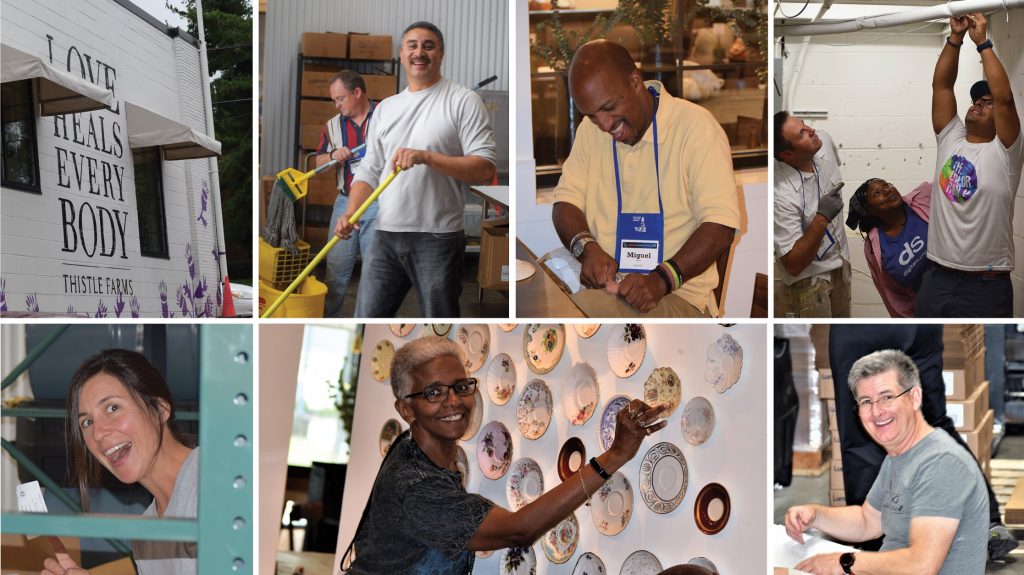This week, the foundation welcomes the Great Lakes Leadership Academy (GLLA), a phenomenal group that seeks to promote economic and environmental vitality in Michigan for the common good.
GLLA traces its roots back to 2004 when faculty at Michigan State University and a diverse group of stakeholders began to develop a unique leadership program. The idea was to bring together individuals from different sectors — people who don’t usually talk to each other let alone have relationships — to work on critical, complex problems faced by Great Lakes communities. Fast forward to today: GLLA has a seven-month emerging leader program and an 18-month leadership advancement program. As a member of GLLA’s governing board, I recently had the opportunity to join the advanced program participants on a 10-day bus trip through the Southeast.
The trip was a capstone event that not only exposed GLLA’s 2016-17 cohort to examples of exceptional leadership, but also enabled them to practice new skills developed over the last year.

One of our first stops was at Thistle Farms in Nashville, Tennessee, which helps women survivors of addiction, trafficking and prostitution. In addition to housing and counseling, Thistle Farm provides employment opportunities in four social-enterprise divisions, including a café and a company that manufactures bath, body and home products. While there, we divided into teams to help with various projects, such as lending a hand in the manufacturing division to help label and package soaps and helping to prepare their new facilities for an upcoming open house. Working with Thistle Farms residents and listening to these courageous women share their personal stories was truly inspiring. In addition to their individual victories, there is also an entrepreneurial success story, for their company is achieving annual revenue increases of 25 percent.
Another major stop was at the Center for Heirs Property Preservation in Charleston, South Carolina. This nonprofit organization works primarily with African-Americans in the region to obtain or clear titles to land they’ve inherited. As explained to us, the heirs’ ancestors may not have had wills in place when they died, resulting in property that passed from generation to generation with unperfected title, which causes problems within families and creates opportunities for unscrupulous developers. In addition to providing legal services to resolve land-ownership disputes, the center also provides technical assistance to help heirs learn about sustainable forestry management so they can increase income from their land.
One takeaway for me here was the unique partnership that allowed the program to succeed — one that required local, state and federal agencies and multiple private organizations to all work together and share a common vision. In addition, the GLLA members led a strategic thinking session to help the center, its partners and stakeholders identify ways they could improve upon and expand programs. The process they used was based on appreciative inquiry, which is a core component in GLLA’s leadership training program.
Appreciative inquiry is an approach to organizational change that focuses on strengths rather than weaknesses. Although I had heard of it before, I had never seen it in action — and found it fascinating. The idea is to start with the good and recognize what’s working before you start to identify what could be improved. This positive protocol breaks down barriers, overcomes suspicion and helps individuals begin to develop trust and build relationships — the kind of relationships that allow people to really start working on problems and identify solutions. It doesn’t mean you’re going to agree, but it’s the basis for finding common ground and an effective solution.
I was already a fan of GLLA before the trip, but spending time with this wonderful group only reinforced the significance of the training program and why it’s so successful. You could see how diversity adds tremendous value — and how appreciative inquiry helps these leaders rise to a higher level.
We need more of this model, which brings diverse groups together and gives them not only new skills but also lasting relationships. Today’s society is becoming increasingly divisive, but that’s not the way to solve problems, especially when it comes to critical, complex ones. Developing trusted relationships among diverse groups is the key to overcoming bias, and appreciative inquiry is a tool for building that bridge. Relationships matter.
Published 10/23/2017
